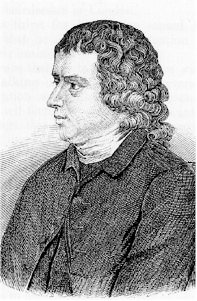This article needs additional citations for verification .(April 2012) |
| "Come Thou Fount of Every Blessing" | |
|---|---|
| Hymn no | |
 | |
| Written | 1758 |
| Text | by Robert Robinson |
| Meter | 8.7.8.7 |
| Melody | "Nettleton" by John Wyeth |
"Come Thou Fount of Every Blessing" is a Christian hymn written by the pastor and hymnodist Robert Robinson, who penned the words in 1757 at age 22. [1] [2] Later in life, he wandered from his faith. A young woman used this hymn to encourage him to return to the Lord. [3]
Contents
Come, Thou Fount of every blessing,
Tune my heart to sing Thy grace;
Streams of mercy, never ceasing,
Call for songs of loudest praise.
Teach me some melodious sonnet,
Sung by flaming tongues above.
Praise the mount, I’m fixed upon it,
Mount of Thy redeeming love.
Sorrowing I shall be in spirit,
Till released from flesh and sin,
Yet from what I do inherit,
Here Thy praises I'll begin;
Here I raise my Ebenezer;
Here by Thy great help I’ve come;
And I hope, by Thy good pleasure,
Safely to arrive at home.
Jesus sought me when a stranger,
Wandering from the fold of God;
He, to rescue me from danger,
Interposed His precious blood;
How His kindness yet pursues me
Mortal tongue can never tell,
Clothed in flesh, till death shall loose me
I cannot proclaim it well.
O to grace how great a debtor
Daily I’m constrained to be!
Let Thy goodness, like a fetter,
Bind my wandering heart to Thee.
Prone to wander, Lord, I feel it,
Prone to leave the God I love;
Here’s my heart, O take and seal it,
Seal it for Thy courts above.
O that day when freed from sinning,
I shall see Thy lovely face;
Clothèd then in blood washed linen
How I’ll sing Thy sovereign grace;
Come, my Lord, no longer tarry,
Take my ransomed soul away;
Send thine angels now to carry
Me to realms of endless day.
The original text [4] of the hymn "Come Thou Fount of Every Blessing"